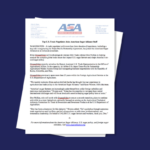Sugar Producers Send Letter to Conaway, Peterson Prior to Mark-Up
The American Sugar Alliance sent a letter to leaders of the House Agriculture Committee yesterday, thanking the panel’s members for supporting sugar policy and asking for support in defeating possible Farm Bill amendments.
The letter expressed sugar farmers’ opposition to legislative proposals to mandate oversupplies with subsidized foreign imports and to exclude sugar farmers from loans that are available to other commodities.
Text of the letter, which was signed by the American Sugar Alliance executive committee, reads as follows:
Dear Chairman Conaway and Ranking Member Peterson:
On behalf of 142,000 U.S. sugar farmers and workers, we thank you both for your continued support of America’s no-cost sugar policy. As the industry’s bankers and accountants noted in the attached letter, sugar producers are facing dire economic pressures right now, and a strong sugar policy will be essential to their ability to obtain financing and weather the storm.
Opponents of this policy – driven by multinational food manufacturers – are aggressively attacking sugar producers’ safety net, which is designed to counter foreign subsidies and unfair trade practices. These attacks come even though food makers have achieved strong profits by charging consumers more for sweetened products and pocketing the savings from sugar prices that are lower today than in 1980.
We will depend on your leadership to beat back legislative attempts to further depress farmers’ prices with heavily subsidized imports. Components of H.R. 4265, which we call the “Sugar Farmer Bankruptcy Bill,” could be offered as Farm Bill amendments, and we fear these policy overhauls would have disastrous consequences if enacted.
There is overwhelming bipartisan support for current sugar policy in the House Agriculture Committee, and its members will be on solid footing in continuing their support. U.S. grocery shoppers pay 22 percent less for sugar than the rest of the developed world. Meanwhile, U.S. confectioners pay 25 percent less than companies in other developed countries and have announced more than 100 domestic expansion projects since the 2014 Farm Bill took hold.
After years of dealing with a market distorted by unlawful, subsidized Mexican sugar imports, U.S. producers need some financial certainty right now. A five-year Farm Bill will go a long way towards providing that certainty, and we hope Congress can deliver a bill this year.
We commend each of you for the manner in which sugar policy discussions have gone to date and appreciate the continuation of existing policy in H.R. 2, the Agriculture and Nutrition Act of 2018. We look forward to working with you as the Farm Bill process unfolds.


